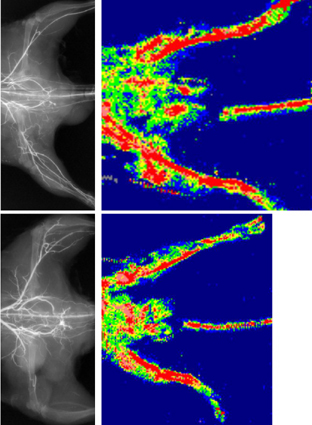Apr 27 2005
Our tissues are able to form new blood vessels throughout life. This mechanism, which is called angiogenesis, is essential notably in the case of myocardial infarction, stroke and limb ischemia. The very same mechanism, however, keeps tumors supplied with nutrients and oxygen thus enabling them to continue growing.

Inserm researchers at the Hospital Lariboisiere and the Institut Curie have just shown that lactadherin plays a key role in the formation of new blood vessels. This discovery opens up promising new avenues in the treatment of cardiovascular diseases, the leading cause of death in France, and in blocking tumor growth.
This work appears in the May 2005 issue of Nature Medicine.
Blood supplies our muscles and all other parts of the body with nutrients and oxygen, removes waste that would otherwise accumulate and become toxic, eliminates carbon dioxide, carries vital messages from one end of the body to the other, and transports antibodies. Pumped by the heart, the blood circulates through a complex network of vessels. To survive, a cell must be no further than 50 mm from the nearest blood vessel.
Blood vessel growth and maturation occur during normal development of the embryo and fetus, and new vessels regularly arise from capillaries to heal wounds or to restore blood flow to an injured tissue. However, during adulthood anomalies in blood vessel growth cause common diseases like heart failure after myocardial infarction. And new vessels development enables tumors to keep growing (see box).
Discovery of a new component of angiogenesis
At the Hôpital Lariboisière, the Inserm team of Ziad Mallat and Jean-Sébastien Silvestre of the European Vascular Genomics Network directed by Alain Tedgui is studying the mechanisms that underlie angiogenesis. At the Institut Curie, the Inserm team of Clotilde Théry and Sebastian Amigorena is investigating the function of natural, small membrane vesicles, the exosomes.
Working together, these two teams have shown that a secreted protein called lactadherin plays a critical part in angiogenesis. Lactadherin is secreted by mammary cells in milk-fat globules, but is also present on exosomes(4). It is also present in large quantities in certain tumors.
One of the main regulators of angiogenesis is called vascular endothelial growth factor (VEGF). If VEGF is introduced into a tissue locally, new blood vessels form. Yet if lactadherin is inactivated in mice, VEGF no longer stimulates angiogenesis: blood vessels no longer form in response to ischemia (lack of blood flow). The Hôpital Lariboisière and Institut Curie scientists have also shown that lactadherin can replace VEGF and induce angiogenesis.
Lactadherin is therefore a promising target for new treatments. By inhibiting lactadherin, we could block angiogenesis and prevent tumor growth. By stimulating lactadherin, we could induce growth of new blood vessels and hence repair tissues damaged by ischemia.